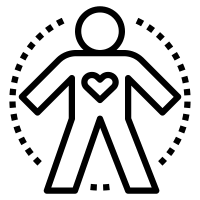How These Simple Things Can Improve Your Physical and Mental Health

December 6, 2020
All of us have hard days, but some of us have long periods of time where we feel down. However, there are some simple changes you can make to improve the quality of your life. Without further ado, let’s get straight to the respective improvements.
To begin with, we must talk about something we’ve all heard, and something a lot of us don’t do. Sleep is vital to the body; this is a time when you rest and prepare your body to tackle the next day. To be prepared for the next day, your body needs at least 8 hours of sleep to reach its maximum potential. Unfortunately, 50-70 million Americans have chronic sleeping disorders, meaning they habitually don’t get enough sleep, with 35% of all Americans getting less than 7 hours of sleep. This is a problem. According to the American Psychological Association, not getting enough sleep impairs the memory and functions of the body while often causing stress on you for much of the day. Less sleep also increases your chance of being in a car accident, Thousands of yearly accidents being caused by drowsy and un-alert drivers. For those of you that have taken lessons to get your driving permit, you would know that not driving while you are sleepy or drowsy is important; now you know why.
For those of you that are thinking to yourselves right now, “well this doesn’t apply to me, I get 5 hours of sleep and I feel just fine.” Statistically speaking, you are probably wrong. Only 1 in a thousand people can function normally with just 6 hours of sleep. Either you are not being honest with yourself about how much sleep your body needs, or you haven’t gotten enough sleep in so long that you don’t even remember how your body can function at its full potential. If this didn’t make you want to change your sleeping schedule already, you should also know that according to the APA and dozens of medical studies, sleep deprivation can lead to high blood pressure, heart disease, stroke, diabetes, obesity, and depression. Chances are you’re probably not that worried about heart disease or strokes at this age, but if you continue an unhealthy habit of sleep deprivation, your body won’t be thanking you in the future. As for mental health, sleep is also vital. As mentioned previously, sleep deprivation will cause drowsiness and can cause depression. So, if you’ve been down lately and feel like you have low energy, trying to get some more sleep. Both your brain and your body will feel better.
Moving on, something else that we all use that may cause you to feel down is social media. “What? What do you mean? What about all the memes and the wholesome videos?” Well, let me explain. According to “Statista,” 79% of Americans used social media in 2019. Chances are, thanks to COVID and people being stuck in their homes, that number probably raised. When you go on social media, you see pictures or videos of your friends probably on vacation, having fun, doing something funny or crazy, etc. These short snapshots of someone else’s life may make your life seem boring or not as active. When you see these snapshots, you’re probably laying down on your bed or maybe you’re being distracted from doing something productive. This idea shows the effects of comparison, you are comparing yourself to something that often isn’t even what it seems. This leads on to the next factor of social media and this is a phenomenon known as the “FOMO” or “Fear of Missing Out.” This is when you are afraid to leave social media because you are afraid of missing out on things. You want to stay on top of the latest trends, memes, and things going on in school. Now that we have established what you often do when using social media, and the feelings that prevent you from spending less time on social media, we can talk about the effects.
According to “Healthline,” a study was conducted with 143 people. Half of the group used social media in the same quantity they usually do, while the other half was limited to only 30 minutes of social media a day. After 3 weeks passed by, the people were all asked how they felt and how their days felt. Almost all the people who were limited to only 30 minutes of social media a day stated that they felt happier, expressed that they had better mental health, and said that they spent their time on more productive things. Stop for a second and think about how much time you spend on social media. According to “Review24,” the average person ages 16-24, so your high school and college students spend 3 hours a day on their phone. Assuming you are getting 8 hours of sleep, which you should, that leaves you with 16 hours of your day to spend. If you spend 3 hours a day on social media, that’s almost 20% of the time you are awake being spent on social media. Yeah, you’re thinking the right thing right now, that’s too much. So why not change it. Let’s be honest, most of your time on social media is either spent on scrolling through meaningless posts and watching videos that probably won’t benefit you. Of course, we all deserve a break and a couple of minutes of these posts and videos cause a smile every now and then, but 3 hours is too much.
Changing this large amount of time, you spend on social media will allow you to do things that are more productive, it will make you feel happier, improve your mental health, and it might even let you get in some extra sleep to hit that goal of 8 hours. Whether your short term and long-term health are more important, or funny videos are more important to you, that’s for you to decide. But the research doesn’t lie, if you want to improve then that’s something you might want to cut out.
And finally, we have something that involves what you eat. We’ve all heard the words, “Junk food is bad for you.” But how many of us really live up to those words and follow them. Well, according to the CDC, 44% of young adults regularly eat junk food. That’s a worrying number. Occasional intake of these foods is okay for you, say you are grabbing a burger with your friends or you just feel like having some Domino’s when you’re watching football. However, eating McDonald’s every other day and eating a bag of hot Cheetos every day, only to wash it all down with some soda is something you should avoid. All this junk food has negative effects on your physical and mental health.
On the physical side, junk food often will cause you to gain weight that often exceeds healthy limits, and your body will have less energy due to lack of nutrients. As for your mental health, food affects it more than you think. According to “Neuroscience News,” excessive consumption of junk food can be bad for a developing brain, which you probably have if you are under the age of 25. According to the “Australian Institute of Personal Trainers,” excessive consumption of junk food can often cause depression and make you feel down or tired. This is due to you stuffing your body with food that has ingredients that not only don’t have benefits but harm your body. When you harm your body, your brain isn’t too happy about it so this may cause you to feel down or will make you have less energy. Moreover, added sugars are also very bad for your memory. They can cause you to forget things that happen in the past and can cause you to forget things easily. So, if you’re about to take a math test, try an apple instead of a bag of added sugars.
So, what do I eat? Well, a lot of changes are simple, instead of chugging down a can of Coke, try a bottle of water or some orange juice instead. Instead of stuffing your mouth with Cheetos and then getting sticky fingers, try a healthier snack, or even some fruit. But what about large meals, like lunch or dinner. How would you replace those meals with a healthier alternative? No, the answer is not ordering from a high-priced restaurant and paying for a steak and some advertised fruit for dozens of your hard-earned dollars. Learn to cook. Cooking will save you money since buying the ingredients yourselves end up costing a lot less. It will also have cognitive benefits where you can do something that requires both mental and physical work but is very rewarding in the end. And if you’re about to say, “but I don’t have time for that,” and you also spend 3 hours a day on social media, then this could be a great opportunity to replace your social media and phone use with something rewarding and productive. Your brain and body will also thank you for this, as you won’t be slowly killing your body with processed junk and you won’t be harming your brain to function worse and cause you to feel down.
Being healthy is rewarding in the short-term, and in the long run, try it out. No more waking up feeling tired and drowsy, get out there, and tackle the day!

Jordan Jackson • Dec 9, 2020 at 11:09 am
This was really informative. It basically summed up everything that has been going on in my life. Especially the part where social media can play a impactful role in depression and mental illness.